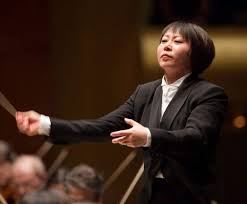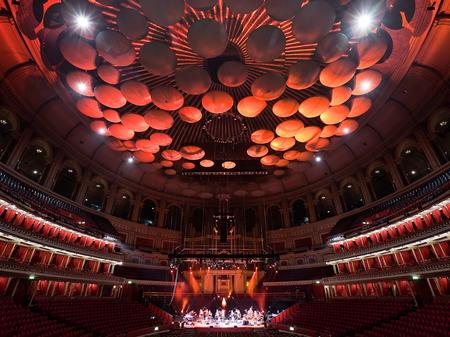BBC National Orchestra & Chorus of Wales today announce that the conductor Xian Zhang has been appointed as Principal Guest Conductor, with effect from 1 September 2016 for an initial three year period.
Xian Zhang said: “I’m so excited to be working with BBC National Orchestra of Wales; they are a fantastic group of musicians who genuinely love making music, and are a natural team. They have some exceptional qualities that have really impressed me. The first thing we ever worked on together was Ravel’s Bolero, it was so precise, with the right colour and texture – I was really speechless after the first reading! Under the strong leadership of Lesley Hatfield, the musicians rehearse in such a disciplined manner that is not often seen. It’s a great pleasure to make music with them and I very much look forward to further developing our relationship in my new role with BBC NOW.”
Michael Garvey, Director, BBC NOW commented: ‘“I am thrilled to be welcoming Xian Zhang to the BBC NOW family as Principal Guest Conductor –bringing yet another exceptional artist to work with us, continuing our commitment to artistic excellence across Wales and further afield. Our recent concerts with her, in Swansea and the BBC Proms, were so energised, balanced and refined; we knew that an appointment would be the perfect fit. We look forward to seeing her back in Cardiff in September.”
During Zhang’s three-year appointment, she will conduct the orchestra in annual concerts at BBC Hoddinott Hall, St David’s Hall and Brangwyn Hall, with repertoire featuring Tchaikovsky, Shostakovich, Rimsky Korsakov and Berlioz in her first season. BBC NOW will also perform at the BBC Proms under Zhang’s baton during her tenure and embark on an ‘On the road’ tour around Wales.
On 27 Sept 2016 Zhang conducts her inaugural concert at BBC Hoddinott Hall in Cardiff, with a programme featuring Tchaikovsky’sSymphony No 4 and Barber’s Violin Concerto, with Chloë Hanslip as soloist. Further highlights of Zhang’s 2016-2017 season include a performance at a prominent welsh music festival and a collaboration with Chinese composer Qigang Chen.
Proms history was made when Marin Alsop became the first woman to conduct the world famous Last Night of the Proms in 2013, and there is a growing wealth of female conductors regularly performing at the BBC Proms and working with the BBC’s orchestras. Xian Zhang will be the first female conductor to have a titled role with a BBC orchestra when she becomes BBC NOW’s Principal Guest Conductor next year.
Rhodri Talfan Davies, Director, BBC Wales, commented: ‘“BBC NOW have had an incredible year, and to top it off we are now announcing this exciting appointment. I’m confident that alongside Principal Conductor Thomas Søndergård, and our dedicated musicians, Xian’s creative input will ensure many more memorable moments in the coming seasons.”
Alan Davey, Controller, BBC Radio 3 said: “Following her stunning performance at this year’s BBC Proms in July, I’m delighted we have booked Xian Zhang for BBC NOW. She is a talented conductor who can bring her passion to bear at an artistically exciting time for the orchestra. The BBC Performing groups are in rude health and their role in the BBC Radio 3 family is essential, where they form the backbone of our concert broadcasts. I’d like to welcome Xian Zhang, and look forward to hearing her first BBC NOW concerts with us.”
Born in Dandong, China, Xian Zhang made her professional debut conducting The Marriage of Figaro at the Central Opera House in Beijing at the age of 20. She trained at Beijing’s Central Conservatory, earning both Bachelor and Master of Music degrees before moving to the United States in 1998. She was appointed the New York Philharmonic’s Assistant Conductor in 2002, subsequently becoming their Associate Conductor and the first holder of the Arturo Toscanini Chair. Zhang has served as Music Director of the Orchestra Sinfonica di Milano Giuseppe Verdi since September 2009 and has recently been announced as the next Music Director of New Jersey Symphony Orchestra.
A regular conductor with the London Symphony and Royal Concertgebouw orchestras, Zhang’s recent highlights include her return to the BBC Proms with BBC NOW, as well as performances with the Rotterdam Philharmonic and Gothenburg Symphony orchestras. This season, she debuts with the Orchestre Philharmonique de Strasbourg and Orquesta y Coro Nacionales de España, and she returns to the Netherlands Radio Philharmonic and Orchestre National de Belgique. Zhang continues to work frequently in North America; recent performances have included a week of Chinese New Year concerts with the Los Angeles Philharmonic. This season’s operatic performances include a return to English National Opera for La bohème and her debut with Den Norske Opera conducting La traviata in January. Following Zhang’s hugely successful production of Nabucco with Welsh National Opera in June 2014, which subsequently transferred to the Savonlinna Festival, she returns to the festival in summer 2016 to conduct Otello, marking her debut with the opera company itself.


